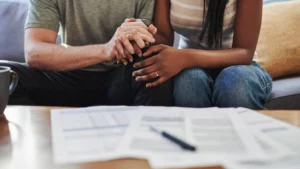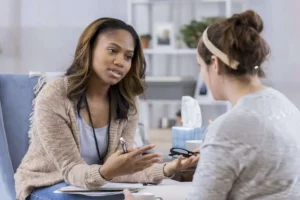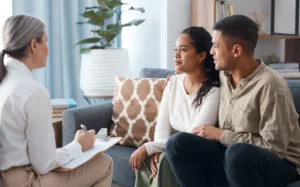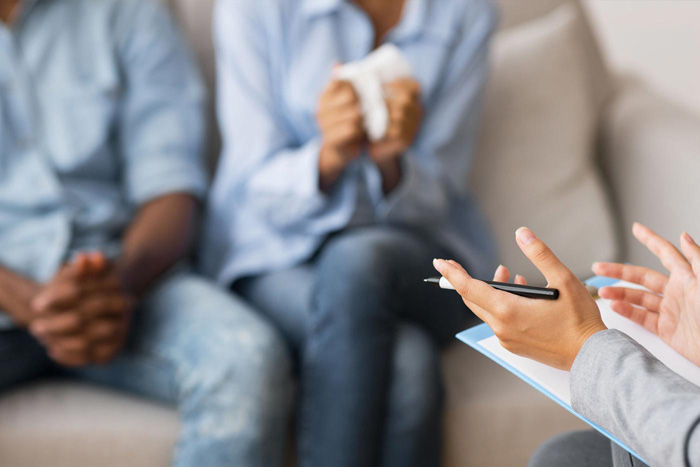In the aftermath of an abortion, couples may find themselves navigating a complex emotional landscape that can strain their relationship. This blog post explores the significance of Couples Therapy After Abortion as a vital resource for couples seeking healing and reconnection. By providing a supportive environment to process emotions, improve communication, and rebuild intimacy.
Contents
What Is Couples Therapy After an Abortion
 Couples Therapy After an abortion delves deeper into the emotional and psychological impact that an abortion can have on both partners in a relationship. It recognizes that the decision to terminate a pregnancy can be a complex and difficult experience, often giving rise to a range of emotions such as grief, guilt, sadness, or relief.
Couples Therapy After an abortion delves deeper into the emotional and psychological impact that an abortion can have on both partners in a relationship. It recognizes that the decision to terminate a pregnancy can be a complex and difficult experience, often giving rise to a range of emotions such as grief, guilt, sadness, or relief.
The therapy process provides a safe and non-judgmental environment where couples can openly express their feelings and thoughts about abortion. The therapist helps facilitate productive conversations and guides the couple in understanding each other’s perspectives, validating their emotions, and fostering empathy. Through compassionate exploration, couples can develop a deeper understanding of their own needs and those of their partner.
Understanding the Emotional Impact of Abortion
 Abortion is a deeply personal decision that can have a significant emotional impact on individuals. It is important to recognize and understand the range of emotions that may arise before and after an abortion.
Abortion is a deeply personal decision that can have a significant emotional impact on individuals. It is important to recognize and understand the range of emotions that may arise before and after an abortion.
These emotions can vary widely from person to person and may include:
- Complex Decision: Abortion is a complex decision that involves weighing various factors, including personal circumstances, beliefs, and values. It is crucial to respect the individual’s autonomy in making this choice.
- Emotional Responses: The emotional responses to abortion can be diverse and may change over time. Some individuals may experience immediate emotions, while others may have delayed reactions. It is important to provide a safe and non-judgmental space for individuals to process their feelings.
- Self-Care and Healing: Encouraging individuals to engage in self-care practices is essential for emotional healing. This can involve activities such as journaling, exercise, mindfulness, or seeking professional help if needed. Each person’s healing journey is unique, and it is important to respect their choices and pace.
- Partner and Relationship Support: Abortion can impact both partners in a relationship. Open and honest communication is crucial in navigating these emotions together. Couples therapy or seeking support from relationship counselors can help strengthen the bond and facilitate healing.
Challenges Faced By Couples After Abortion
After an abortion, couples often encounter various challenges that can impact their relationship and emotional well-being. These challenges include:
Divergent Emotional Responses
Divergent emotional responses refer to the different emotional reactions that partners may have following an abortion. This can include feelings such as guilt, relief, sadness, or a sense of loss. Divergent emotional responses can create challenges in understanding and supporting each other, requiring open communication and empathy to bridge the gap.
Communication Breakdown
Communication breakdown refers to difficulties or barriers in effectively exchanging thoughts, emotions, and information between partners after an abortion. It can lead to misunderstandings, conflicts, and a lack of emotional support. Overcoming communication breakdown requires active listening, empathy, and a willingness to express and understand each other’s perspectives.
Grief Processing Differences
Grief processing differences refer to the varying ways in which individuals within a couple may cope with and process their grief after an abortion. This can include differences in expressing emotions, seeking support, or dealing with the loss. Recognizing and respecting these differences is crucial for understanding and supporting each other through the grieving process.
Coping with External Factors
Coping with external factors involves managing the influence of societal judgments, unsupportive family or friends, or other external pressures following an abortion. It can be challenging to navigate these factors, but seeking support, setting boundaries, and focusing on self-care can help couples overcome their impact and strengthen their relationship.
Impact on Future Decisions
Impact on future decisions refers to how the experience of abortion can influence choices related to family planning. It can create uncertainty, concerns, or conflicts about reproductive decisions, such as timing or whether to have children in the future. Open communication and mutual understanding are crucial in navigating these decisions as a couple.
How Couples Therapy After Abortion Helps To Overcome?
 Couples therapy after abortion can provide a supportive and healing space for partners to navigate the challenges they face. It helps by:
Couples therapy after abortion can provide a supportive and healing space for partners to navigate the challenges they face. It helps by:
- Communication Improvement: Therapy facilitates open and empathetic communication, helping partners express their emotions, concerns, and needs more effectively. It fosters understanding and strengthens their connection.
- Grief Processing: Therapists assist couples in processing grief and navigating the complex emotions that arise after abortion. They provide tools and guidance to support each partner’s individual healing journey.
- Rebuilding Trust and Familiarity: Couples therapy helps rebuild trust and intimacy that may have been strained by the abortion experience. It provides a safe environment to address issues and work towards re-establishing emotional and physical closeness.
- Future Planning and Decision-Making: Couples therapy assists in exploring future planning and decision-making around family planning. It facilitates conversations about desires, concerns, and potential conflicts, helping partners make informed choices together.
- Individual and Relationship Growth: Therapy supports personal growth and enhances the couple’s resilience. It encourages self-reflection, self-care practices, and the development of healthier coping mechanisms, fostering overall emotional well-being.
Couples therapy after abortion offers a safe and non-judgmental space for partners to process their emotions, rebuild their relationship, and find a path toward healing and growth. With the guidance of a therapist, couples can navigate the challenges together, strengthen their bond, and move forward in their journey of recovery.
The Major Benefits of Couples Therapy
 Couples therapy after abortion offers specific benefits to partners navigating the emotional aftermath of the experience. Some of the major benefits include:
Couples therapy after abortion offers specific benefits to partners navigating the emotional aftermath of the experience. Some of the major benefits include:
- Relationship Strengthening: Therapy strengthens the bond between partners, fostering resilience and mutual support. It helps them navigate the complexities of the abortion experience together, deepening their connection and promoting relationship growth.
- Mutual Empowerment: Therapy empowers partners by providing them with a safe space to express their needs and desires, fostering a sense of equality and mutual support. It encourages partners to work as a team in overcoming challenges.
- Improved Coparenting Skills: For couples who already have children or plan to have them in the future, therapy can enhance co-parenting skills. It promotes effective communication, cooperation, and alignment in parenting approaches.
- Increased Resilience: Couples therapy after abortion helps partners develop resilience in the face of emotional and external challenges. It equips them with tools and strategies to overcome difficulties and fosters a sense of strength in the relationship.
Overall, couples therapy after abortion offers a space for partners to process their emotions, rebuild their relationship, and move forward together with increased understanding, resilience, and emotional well-being.
Conclusion
Couples therapy after abortion offers a valuable opportunity for couples to heal, grow, and rebuild their relationship. By addressing the emotional impact of abortion, improving communication, rebuilding trust, developing coping strategies, reconnecting intimacy, and prioritizing self-care, couples can navigate the complexities of this experience together. With the guidance of a qualified therapist, couples can find healing, understanding, and renewed strength as they move forward in their lives.
Addressing and resolving couple of issues is essential for a strong and lasting partnership. If you have any queries regarding Online Couple Counseling experienced therapists at CoupleMantra can help. Book a trial couple therapy session.


